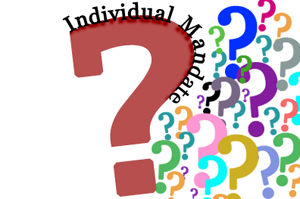Healthcare reform: What does the individual Mandate mean to me?
Posted by Anna Koehler on Jan 6, 2015 in Health Insurance News
A key provision of the Affordable Care Act (ACA) is the individual mandate, which requires most individuals to purchase health insurance coverage or pay a penalty.
What is the individual mandate?
The ACA requires most individuals to obtain acceptable health insurance coverage for themselves and their family members or pay a penalty.
How much will the individual mandate
penalty cost me?
The penalty for not obtaining acceptable health insurance coverage is being phased in over a three-year period. The amount of the penalty is the greater of two amounts— the “flat dollar amount” and “percentage of income amount.
For 2014, the penalty is $95 per person or 1 percent of income. For 2015, the penalty is $325 per person or 2 percent of income. In 2016 and after, the penalty is $695 per person or 2.5 percent of income
“Income” for this purpose is your household income minus your exemption (or exemptions for a married couple) and standard deductions. Families will pay half the penalty amount for children.
The penalty is calculated on a monthly basis and will be assessed for each month in which you go without coverage. There is no penalty for a single lapse in coverage lasting less than three months in a year.
Because this provision has the effect of requiring individuals to have coverage, it is often referred to as the individual mandate.
Who is exempt from the individual mandate?
You may be exempt from the individual mandate penalty if you:
Cannot afford coverage (that is, a required contribution for coverage would cost more than 8 percent of your household income)
• Have income below the federal income tax filing threshold
• Are not a citizen, national or lawfully present in the United States
• Experience a gap in coverage for less than a continuous three-month period
• Qualify as a religious conscientious objector
• Are a member of a health care sharing ministry
• Are a member of certain Indian tribes
• Are given a hardship exemption by HHS
• Are incarcerated
If you are eligible for an exemption for any day of a month, the Internal Revenue
Service (IRS) has said you will be treated as exempt for the entire month.
Also, if you obtained health insurance coverage (either an Exchange plan or group or individual coverage outside of the Exchange) with an effective date on or before May 1, 2014, you will be exempt from the individual mandate penalty for months prior to the effective date of your coverage.
How do I qualify for a hardship exemption?
The hardship exemption is available through the Exchange if you face a hardship that prevents you from obtaining coverage. HHS has said that each of the following situations will always qualify as a hardship:
• If you turn down coverage because the Exchange projects that it will be unaffordable (even if your actual income for the year turns out to be higher, so that you are not eligible for the affordability exemption)
• If you are not required to file an income tax return but technically fall outside the exemption for those with household income below the filing threshold
• If you would be eligible for Medicaid under the expansion but live in a state that does not expand Medicaid eligibility
If you face other unexpected personal or financial hardships, you may be eligible for a hardship exemption. This will be determined on a case-by-case basis.
How will the penalty be collected?
Starting in 2015, everyone who files a federal tax return for the previous year will be required to report the following:
• Which members of your family (including yourself) are exempt from the individual mandate?
• Whether each person who is not exempt had insurance coverage for that year
You will owe a penalty for each non-exempt family member who doesn’t have coverage. If you and your spouse file a joint return, you are jointly liable for the penalties that apply to either or both of you.
If you are eligible to claim a dependent, you will be responsible for reporting and paying the penalty for that dependent.
Is there financial assistance available to help me purchase health insurance coverage?
Federal subsidies in the form of premium tax credits and cost-sharing reductions are available to low-income individuals who purchase health insurance through an Exchange. The Exchanges became operational Jan. 1, 2014.
To be eligible for a premium tax credit, you:
• Must generally have household income that is between 100 percent and 400 percent of the federal poverty line (FPL) for your family size
• May not be claimed as a tax dependent of another taxpayer
• Must file a joint return, if married
• Must enroll in one or more qualified health plans through an Exchange
• Cannot be eligible for minimum essential coverage (such as coverage under a government-sponsored program or an eligible employer-sponsored plan)
The amount of the premium tax credit varies based on your household income.
Some individuals who are enrolled in coverage through an Exchange may also be eligible for cost-sharing reductions to help them pay their medical expenses. Only those individuals with household incomes of up to 250 percent of the FPL are eligible.
There are several premium subsidy calculators available online that you can use to
predict your health care costs, including this one.
For more information about individual insurance and health care reform, or for help
getting started, contact Koehler, Koehler Inc. today.


